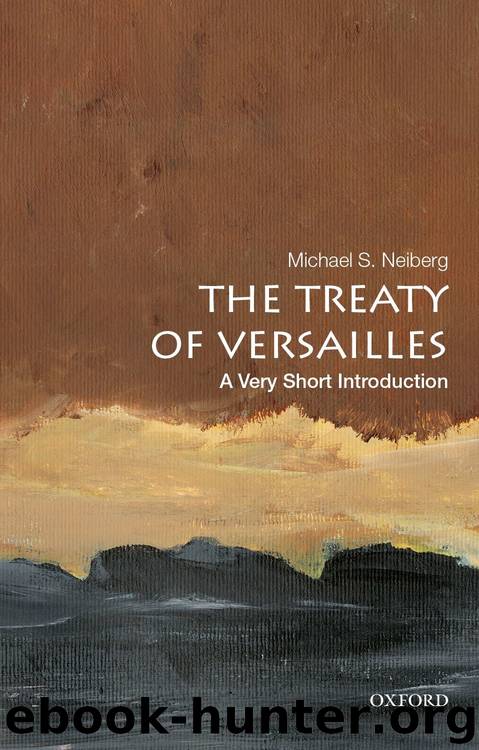The Treaty of Versailles by Michael S. Neiberg

Author:Michael S. Neiberg
Language: eng
Format: epub
ISBN: 9780190645007
Publisher: Oxford University Press
Published: 2018-10-10T00:00:00+00:00
Chapter 4
Drafting the treaty
By the first week of May 1919, the lawyers, diplomats, and staffers had a full draft of the Treaty of Versailles ready. Although the Big Three recognized that it was far from perfect, the Paris Peace Conference had been in session since January and could not go on indefinitely. Winter had turned to spring in Paris, but the change of the seasons had not produced much optimism or hopeful sense of renewal as the conference had dragged on with much work still to do. As symbols of how much remained to accomplish, the Italians were showing signs of anger over Allied refusal to recognize their claims to Fiume, and in China a series of protests, some of them violent, had broken out over the news that Japan would take effective control of the Shandong Peninsula. In March the German minister of defense, Gustav Noske, had ordered forty thousand members of the Freikorps paramilitary units to use machine guns, flamethrowers, mortars, and even airplanes against left-leaning Germans. More than 1,200 of them lay dead. Sooner or later the negotiations had to end, and the treaty with Germany had to be signed if any semblance of stability were to return.
On May 7, the fourth anniversary of the sinking of the Lusitania, the Allies summoned the Germans to France for the official presentation of the terms of the treaty. Clemenceau, Lloyd George, and Wilson ignored Foch’s final urgent plea for detaching the Rhineland from Germany. The Big Three delivered to the German government a copy of the terms, which they hoped they could keep secret for a few days. More than 180 German delegates and technical specialists came to France to study the treaty and, they hoped, negotiate with the Allies on some of its most controversial points.
The timing was delicate. Writing at about this time, the Prussian theologian Ernst Troeltsch described a “Dreamland” state in which the German people transferred all blame for Germany’s defeat to Kaiser Wilhelm. For a few months after the end of hostilities in November 1918, the Germans believed that the defeat of the old regime had purged Germany of its sins, leaving the German people free to chart a new political course without the weight of the guilt borne by a now disgraced regime. Troeltsch believed that this Dreamland state made it all the more difficult for the German people to accept the full magnitude of their defeat on the battlefield. Instead, they expected that the victorious allies would lay the blame on the kaiser and his retinue, as they themselves did. Wilson’s own rhetoric, which sharply divided the German people from their government, gave the Germans reason to think so. But rumors about the contents of the Treaty of Versailles and the unwillingness of the Allies to press Holland to release Wilhelm so that he could stand trial for war crimes came as a great shock and further fed into both the disillusion and the anger among the German people.
The terms of the treaty, moreover, soon leaked out.
Download
This site does not store any files on its server. We only index and link to content provided by other sites. Please contact the content providers to delete copyright contents if any and email us, we'll remove relevant links or contents immediately.
The Secret History by Donna Tartt(16606)
The Social Justice Warrior Handbook by Lisa De Pasquale(11485)
Thirteen Reasons Why by Jay Asher(7779)
This Is How You Lose Her by Junot Diaz(5753)
Weapons of Math Destruction by Cathy O'Neil(5027)
Zero to One by Peter Thiel(4816)
The Myth of the Strong Leader by Archie Brown(4785)
Promise Me, Dad by Joe Biden(4439)
Stone's Rules by Roger Stone(4412)
Beartown by Fredrik Backman(4403)
How Democracies Die by Steven Levitsky & Daniel Ziblatt(4392)
The Fire Next Time by James Baldwin(4336)
100 Deadly Skills by Clint Emerson(4070)
A Higher Loyalty: Truth, Lies, and Leadership by James Comey(4024)
Rise and Kill First by Ronen Bergman(4008)
The David Icke Guide to the Global Conspiracy (and how to end it) by David Icke(3875)
The Farm by Tom Rob Smith(3869)
Secrecy World by Jake Bernstein(3773)
The Doomsday Machine by Daniel Ellsberg(3725)
